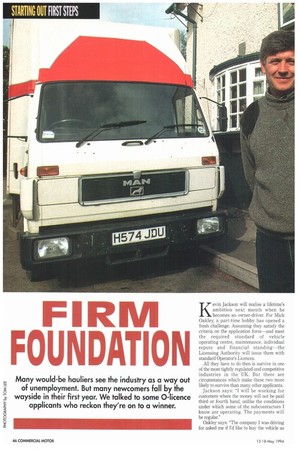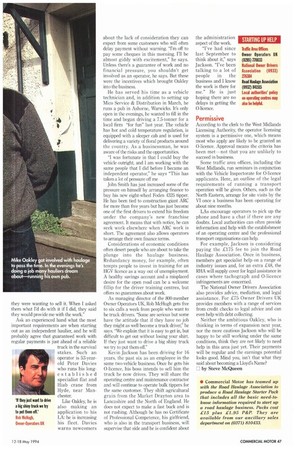FIRM
Page 50

Page 51

If you've noticed an error in this article please click here to report it so we can fix it.
FOUNDATION
Many would-be hauliers see the industry as a way out of unemployment. But many newcomers fall by the wayside in their first year. We talked to some 0-licence applicants who reckon they're on to a winner.
Kevin Jackson will realise a lifetime's ambition next month when he becomes an owner-driver. For Mick Oakley, a part-time hobby has opened a fresh challenge. Assuming they satisfy the criteria on the application form—and meet the required standard of vehicle operating centre, maintenance, individual repute and financial standing—the Licensing Authority will issue them with standard Operator's Licences.
All they have to do then is survive in one of the most tightly regulated and competitive industries in the UK. But there are circumstances which make these two more likely to survive than many other applicants.
Jackson says: 'I will be working for customers where the money will not be paid third or fourth hand, unlike the conditions under which some of the subcontractors I know are operating. The payments will be regular."
Oakley says: "The company I was driving for asked me if I'd like to buy the vehicle as
they were wanting to sell it. When I asked them what I'd do with it if I did, they said they would provide me with the work."
Ask an experienced hand what the most important requirements are when starting out as an independent haulier, and he will probably agree that guaranteed work with regular payments is just ahead of a reliable
truck in the survival ;44) stakes. Such an operator is 53-yearold Peter Davies who runs his longestablished specialist flat and Hiab crane from Hyde, near Manchester.
Like Oakley, he is also making an application to his LA: he is increasing his fleet. Davies warns newcomers
about the lack of consideration they can expect from some customers who will often delay payment without warning. "I'm off to pay some cheques in this morning. I'll be almost giddy with excitement," he says. Unless there's a guarantee of work and no financial pressure, you shouldn't get involved as an operator, he says. But these were the incentives which brought Oakley into the business.
He has served his time as a vehicle technician and, in addition to setting up Mico Service & Distribution in March, he runs a pub in Ashorne, Warwicks. Ifs only open in the evenings, he wanted to fill in the time and began driving a 7.5-tonner for a local firm "for fun" last year. The vehicle has hot and cold temperature regulation, is equipped with a sleeper cab and is used for delivering a variety of floral products around the country. As a businessman, he was aware of the risks and the opportunities.
"I was fortunate in that I could buy the vehicle outright, and I am working with the same people that I did before I became an independent operator," he says "This has taken a lot of pressure off me John Smith has just increased some of the pressure on himself by arranging finance to buy his new eight-wheel Foden 4325 tipper. He has been tied to construction giant ARC for more than five years but has just become one of the first drivers to extend his freedom under the company's new franchise agreement. It means that with notice, he can seek work elsewhere when ARC work is short. The agreement also allows operators to arrange their own finance terms.
Considerations of economic conditions often desert people who are about to take the plunge into the haulage business. Redundancy money, for example, often tempts people to invest in training for an HGV licence as a way out of unemployment. A healthy savings account and a misplaced desire for the open road can be a welcome fillip for the driver training centres, but offers no guarantees about work.
As managing director of the 800-member Owner Operators UK, Rob McHugh gets five to six calls a week from people who want to be truck drivers. "Some are serious but some have the attitude that if they have no job they might as well become a truck driver," he says. "We explain that it is easy to get in, but difficult to get out without losing your shirt. If they just want to drive a big shiny truck we try to put them off."
Kevin Jackson has been driving for 16 years, the past six as an employee in the same two-vehicle business. Once he gets his 0-licence, his boss intends to sell him the truck he now drives. They will share the operating centre and maintenance contractor and will continue to operate bulk tippers for the same customer. They shift agricultural grain from the Market Drayton area to Lancashire and the North of England. He does not expect to make a fast buck and is not rushing. Although he has no Certificate of Professional Competence, his girlfriend, who is also in the transport business, will supervise that side and he is confident about the administration aspect of the work.
"I've had since last September to think about it," says Jackson. "I've been talking to a lot of people in the business and I know the work is there for me." He is just hoping there are no delays in getting the 0-licence.
Permissive According to the clerk to the West Midlands Licensing Authority, the operator licensing system is a permissive one, which means most who apply are likely to be granted an 0-licence. Approval means the criteria has been met—not that you are unlikely to succeed in business.
Some traffic area offices, including the West Midlands, run seminars in conjunction with the Vehicle Inspectorate for 0-licence applicants. Here, an outline of the legal requirements of running a transport operation will be given. Others, such as the North Eastern, arrange for site visits by the VI once a business has been operating for about nine months.
LAs encourage operators to pick up the phone and have a chat if there are any doubts. Local authorities can often provide information and help with the establishment of an operating centre and the professional transport organisations can help.
For example, Jackson is considering paying the £175 fee to join the Road Haulage Association. Once in business, members get specialist help on a range of industry issues and, for an extra /48, the RHA will supply cover for legal assistance in cases where tachograph and 0-licence infringements are concerned.
The National Owner Drivers Association also provides advice, mediation, and legal assistance. For £75 Owner Drivers UK provides members with a range of services from credit checks to legal advice and can even help with debt collecting.
Neither the ambitious Oakley, who is thinking in terms of expansion next year, nor the more cautious Jackson who will be happy to be still working under the same conditions, think they are not likely to need help in this area just yet. Their payments will be regular and the earnings potential looks good. Mind you, isn't that what they said about becoming a Lloyd's Name?
El by Steve McQueen














































































































